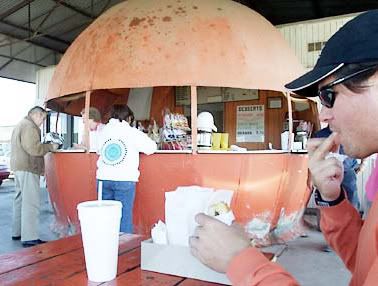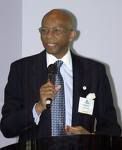It really pisses me off that the Speaker has put himself and the Party in this position. $4 million dollars out of that “Friends of Fabian Nuñez” jet-setting travel fund came directly from the party. And now, the allegations in the LA Times have led to a formal complaint with the state’s Fair Political Practices Comission for using campaign funds for personal expenses. I’m putting the complaint on the flip side.
This is playing out in the context of February’s term limits initiative, and indeed the complaint was filed by the executive director of the “CA Term Limits Defense Fund.” But again, that doesn’t make it false. Nuñez’ reticence to provide some more disclosure in this case is DIRECTLY hurting party-building efforts. This is the Democratic poster child, now? A party that consolidates political power to the degree that Democrats have in this state always runs the risk of dragging themselves into a morass of corruption. This is an outgrowth of insiderism and a centralized target for special interests. Maybe it’s good that this is happening, as it gives Democrats a chance to demand accountability and new leadership. But for the moment, it sucks.
Re: Formal Complaint and Demand for Investigation
Dear Commission Chair Johnson and Ms. Saxton:
1. Grounds for Complaint
This letter is a formal complaint by the undersigned against California State Assemblyman Fabian Nunez (AD 46) regarding his failed compliance with the California Political Reform Act (“PRA”). The Fair Political Practices Commission (“FPPC”) is required to inform me in writing of the action the FPPC has taken or will take on the sworn complaint within 14 days. (Gov. Code, § 83115.)
This complaint is made under Government Code sections 91003 and 83115. Specifically, the undersigned requests the FPPC to investigate and commence civil or administrative action against Assembly Speaker Nunez for his illegal use of campaign funds for personal expenses. In the interim, the undersigned requests the FPPC to initiate action for an injunction compelling Assembly Speaker Nunez to cease and desist violating the PRA.
2. Background Facts
In 2002, Fabian Nunez was first elected to the State Legislature as an Assemblyman for the 46th Assembly District. In 2004, Assemblyman Nunez was elected the State’s 66th Speaker. As a state candidate and officeholder, Assembly Speaker Nunez has raised millions of dollars in contributions since 2002. However, as recently reported on October 5th in the Los Angeles Times, tens of thousand of dollars in campaign funds have been spent on personal expenses for international trips rather than political expenses.
Attached to this letter as Attachment “A,” is a list of expenditures reported by Assembly Speaker Nunez’s candidate committee, “Friends of Fabian Nunez 2006,” having occurred from 1/1/2005 through 12/31/2006, which appear to present personal rather than political expenses. These expenditures appear in the Schedule E’s of the respective Form 460 reports filed by the candidate committee covering this period.
A quick review of Attachment A reveals 1) nearly $13,000 in florist purchases (Fresh Cut Florist & Gifts, Inc. and Posh Shoppe, Inc.); 2) nearly $3,000 in limousine services (Abe’s Sedan and Limo Service); 3) nearly $1,000 in rare collectibles purchases (Old Sacramento Stamp Company); 4) over $1,100 in personal reading purchases (Capitol Books & Gifts); 5) over $1,250 in high-end cookie purchases (Goodie Tuchews); 6) over $1,100 in fine and rare wine purchases (Marcato Italia, Inc., and Capitol Cellars); 7) over $13,500 in payments to Janine Schwartz described as everything from “petty cash” to “civic donations;” and 8) more than $10,000 in various travel expenses)
Additionally attached to this letter as Attachment “B,” is a list of expenditures reported by Assembly Speaker Nunez’s candidate committee, “Friends of Fabian Nunez 2006,” having occurred since 1/1/2007 through the 6/30/2007, which appear to present personal rather than political expenses. These expenditures appear in the Schedule E of the Form 460 report filed by the candidate committee covering this period.
A quick review of Attachment B reveals 1) over $5,000 in florist purchases (Fresh Cut Florist & Gifts, Inc. and Posh Shoppe Inc.); 2) nearly $600 in DVD theatrical movie purchases (Paramount Home Entertainment); 3) over $150 in personal reading purchases (Capitol Books & Gifts); 4) nearly $800 in high-end cookie purchases (Goodie Tuchews); 5) over $4,000 in payments to Janine Schwartz for “petty cash” and other purposes; and 6) more than $8,000 spent at the Silverado Resort and Spa in Napa, California.
Finally, attached to this letter as Attachment “C,” is a list of expenditures reported by Assembly Speaker Nunez’s candidate committee, “Friends of Fabian Nunez 2006,” having occurred since 10/22/2006 through 6/30/2007, which appear to present personal rather than political expenses. These expenditures appear in the Schedule G’s of the respective Form 460 reports filed by the candidate committee covering this period.
A quick review of Attachment C reveals 1) over $8,750 in furniture, decorations and appliance expenditures (Nordstorm Inc., Pottery Barn, Macy’s, Arden Fair Mall, Williams Sonoma, Haggin Oaks Golf Course); 2) over $3,100 on clothing and accessories buys (Patrick James, Pavilion Salon Shoes, Roger Stuart Clothes Inc., Julius Clothing, Louis Vuitton, Coach); 3) nearly $1,500 in florist purchases (Twiggs Floral Design Gallery, Chula Vista Florist, Resort Florist, Weigum’s Nursery, IXIA Florist, Posh Shoppe Inc.); 4) nearly $700 in high-end strawberries purchases (Shari’s Berries); 5) $250 spent on bicycle purchases (Mike’s Bikes of Sacramento); and 6) nearly $70,000 in travel and food expenses.
3. Committee Funds May Not Be Used For Personal Expenses
Government Code section 89513 limits how committee funds may be spent. In particular, Section 89513, subdivision (d) provides: “Campaign funds shall not be used for campaign, business, or casual clothing except specialty clothing that is not suitable for everyday use… and is directly related to a political, legislative, or governmental purpose.” As set forth above, the several clothing expenditures listed in Attachment C suggest Assembly Speaker Nunez has violated this subdivision.
Additionally, Section 89513, subdivision (f)(1) provides: “Campaign funds shall not be used to make personal gifts unless the gift is directly related to a political, legislative, or governmental purpose.” Again, as set forth above, the several apparent gift expenditures listed in Attachments A, B, and C suggest Assembly Speaker Nunez has violated this subdivision.
Finally, Section 89510, subdivision (b) provides, “All contributions deposited into the campaign account shall be deemed to be held in trust for expenses associated with the election of the candidate or for expenses associated with holding office.” In turn, Section 89512.5 states, “An expenditure to seek office is within the lawful execution of the trust imposed by Section 89510 if it is reasonably related to a political purpose. An expenditure associated with holding office is within the lawful execution of the trust imposed by Section 89510 if it is reasonably related to a political, legislative or governmental purpose, and under Section 89512.5 if it confers a personal benefit is directly related to a legislative, political or governmental purpose. Expenditures which confer a substantial personal benefit shall be directly related to a political, legislative, or governmental purpose.” As set forth above, the expenditures listed in Attachments A, B, and C do not appear to be reasonably or directly related to a legitimate political, legislative or governmental purpose. As such the expenditures listed in Attachments A, B, and C suggest Assembly Speaker Nuenz has violated these two sections.
4. The PRA Expressly Authorizes the Commission to Seek Injunctive Relief
as a Remedy for Violations of the Act
Government Code section 91003(a) state in pertinent part:
Any person residing in the jurisdiction may sue for injunctive relief to enjoin violations or to compel compliance with the provisions of this title. The court may in its discretion require any plaintiff other than the commission to file a complaint with the commission prior to seeking injunctive relief.
“The Commission has primary responsibility for the impartial, effective administration and implementation of [the PRA].” (Gov. Code § 83111.) Accordingly, Government Code § 91001 states in pertinent part:
The civil prosecutor is primarily responsible for enforcement of the civil penalties and remedies of ths title. The civil prosecutor is the commission with respect to the state of any state agency, except itself…. The civil prosecutor may bring any civil action under this title which could be brought by a voter or resident of the jurisdiction.
In the exercise of its authority as the civil prosecutor for the state, the Commission must bring a civil injunctive action to enforce the PRA’s campaign disclosure provision against Assembly Speaker Nunez.
5. Public Policy Supports Pursuing Injunctive Relief in this Circumstance
In the wake of the Watergate scandal, the People of the State of California enacted the Political Reform Act by initiative in 1974. The PRA seeks to ensure that State and local government officials and candidates “serve the needs and respond to the wishes of all citizens equally, without regard to their wealth.” (Gov. Code § 81001(a).)
The PRA finds, among other things, that “existing laws for disclosure of campaign receipts and expenditures have proved to be inadequate” (Gov. Code § 81001(d)), and that “previous laws regulating political practices have suffered from inadequate enforcement” (Gov. Code § 81001.) Purposes of the PRA include fully informing voters and inhibiting improper practices (§ 81002(a)) and providing adequate enforcement mechanisms to public officials and private citizens so that the PRA will be “vigorously enforced.” (Gov. Code § 81002.)
Californians have voted on numerous occasions to strengthen the PRA by establishing contribution limits. Proposition 34, adopted by the voters in the November 2000 general election, established those limits after their previous efforts succumbed to judicial challenges. (Gov. Code §§ 85300 et seq.) Notably, Proposition 34 also increased the administrative penalties in conjunction with these new limits. (Gov. Code § 83116(c).)
Additional indicia of the voters’ determination to protect the integrity of their governmental processes from the corrupting influence of money include the PRA’s provision for “vigorous enforcement” (Gov. Code § 81002(f)), the requirement that the PRA be liberally construed in favor of the purposes of the Act (§ 81003), and the severe restrictions on the Legislature’s power to amend the Act (Gov. Code § 81012(a)). Any amendment to the statute must “further its purposes” and must be passed in each house of the Legislature by a two-thirds vote of the membership. (Gov. Code § 81012(a).) Alternatively, the PRA may only be amended or repealed by a statute that “becomes effective only when approved by the electors.” (Gov. Code § 81012(b).)
6. The PRA Expressly Authorizes the Commission to Also Seek Civil Penalties as a Remedy for Violations of the Act
As discussed above, Government Code § 91001 states that “The [Commission] is primarily responsible for enforcement of the civil penalties and remedies of [the PRA].” Correspondingly, Government Code § 91005.5 provides that any person who violates any provision of the PRA, for which no specific civil liability is provided, shall be liable in a civil action brought pursuant to Government Code § 91001(b) for an amount up to five thousand dollars ($5,000) per violation.
The foregoing is true and correct or if stated on information and belief, that I believe it to be true and correct. Executed under penalty of perjury under the laws of the State of California this 9th day of October, 2007 at Sacramento, California.
Bob Adney
California Term Limits Defense Fund, Executive Director


 On Highway 99, near Chowchilla, stands a vacant metal building with a canopy that shelters a
On Highway 99, near Chowchilla, stands a vacant metal building with a canopy that shelters a  Unfortunately, the Democratic definition of “targeting” seems to bear an uncanny resemblance to catnapping. Take, for example, the City of San Ramon elections for mayor and City Council that were scheduled for this November.
Unfortunately, the Democratic definition of “targeting” seems to bear an uncanny resemblance to catnapping. Take, for example, the City of San Ramon elections for mayor and City Council that were scheduled for this November.  San Ramon Mayor Abram Wilson has loaned his campaign $95,000. He has received $18,474 from other contributors.
San Ramon Mayor Abram Wilson has loaned his campaign $95,000. He has received $18,474 from other contributors.